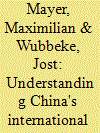|
|
|
Sort Order |
|
|
|
Items / Page
|
|
|
|
|
|
|
| Srl | Item |
| 1 |
ID:
108412


|
|
|
|
|
| Publication |
2011.
|
| Summary/Abstract |
China has grown increasingly dependent on imports of oil and, as a consequence, has become a major and very visible player in the international energy markets. For a country which has traditionally been strongly committed to the principle of self-reliance, this dependence on foreign oil has been a source of vulnerability and anxiety. But it has also been a strategic opportunity for China to chart its own ambitions and objectives as a global economic and political actor. This article addresses the various ways in which China has incorporated its energy import needs within its foreign policy. There are, it is argued, three dimensions to this. There is, first, integration and cooperation with the West and other large oil-importing countries and a shift away from neo-mercantilism to a growing reliance on international markets. Second, there is a complementary strategy of balancing, which seeks to develop the energy resources close to its borders, in Russia and Central Asia, which are not so vulnerable to western intervention. And third, there is the construction, though preliminary and nascent at the moment, of a hegemonic order which challenges the US and the West in the critical maritime routes from the Pacific to the Indian Ocean and through to the Persian Gulf region.
|
|
|
|
|
|
|
|
|
|
|
|
|
|
|
|
| 2 |
ID:
123758


|
|
|
|
|
| Publication |
2013.
|
| Summary/Abstract |
Focusing on the relationship between oil imports and China's compromising and business-like attitude, this article shows that empirical observations do not support several commonplace assumptions that China's growing oil dependence leads to conflict scenarios. The non-escalating nature of the Chinese energy policy constitutes an intriguing puzzle. Although the country currently relies on foreign oil for more than half of its consumption, it does not possess a single overseas base, has not employed troops to secure oil supplies, and strongly relies on world markets to satisfy the growing energy demand. Instead, the main components of the Chinese policy are based on pragmatism fostering integration into existing supply systems and market institutions. This analysis, in turn, points to the importance of structural conditions within global energy politics on the one hand, and pragmatist behaviour on the other, rather than internal motivations or strategic intentions, in order to understand the evolution of China's energy policies. Finally, we briefly discuss the possibility of a reverse dynamic-possibly emerging due to a changing regional or global environment.
|
|
|
|
|
|
|
|
|
|
|
|
|
|
|
|
|
|
|
|
|